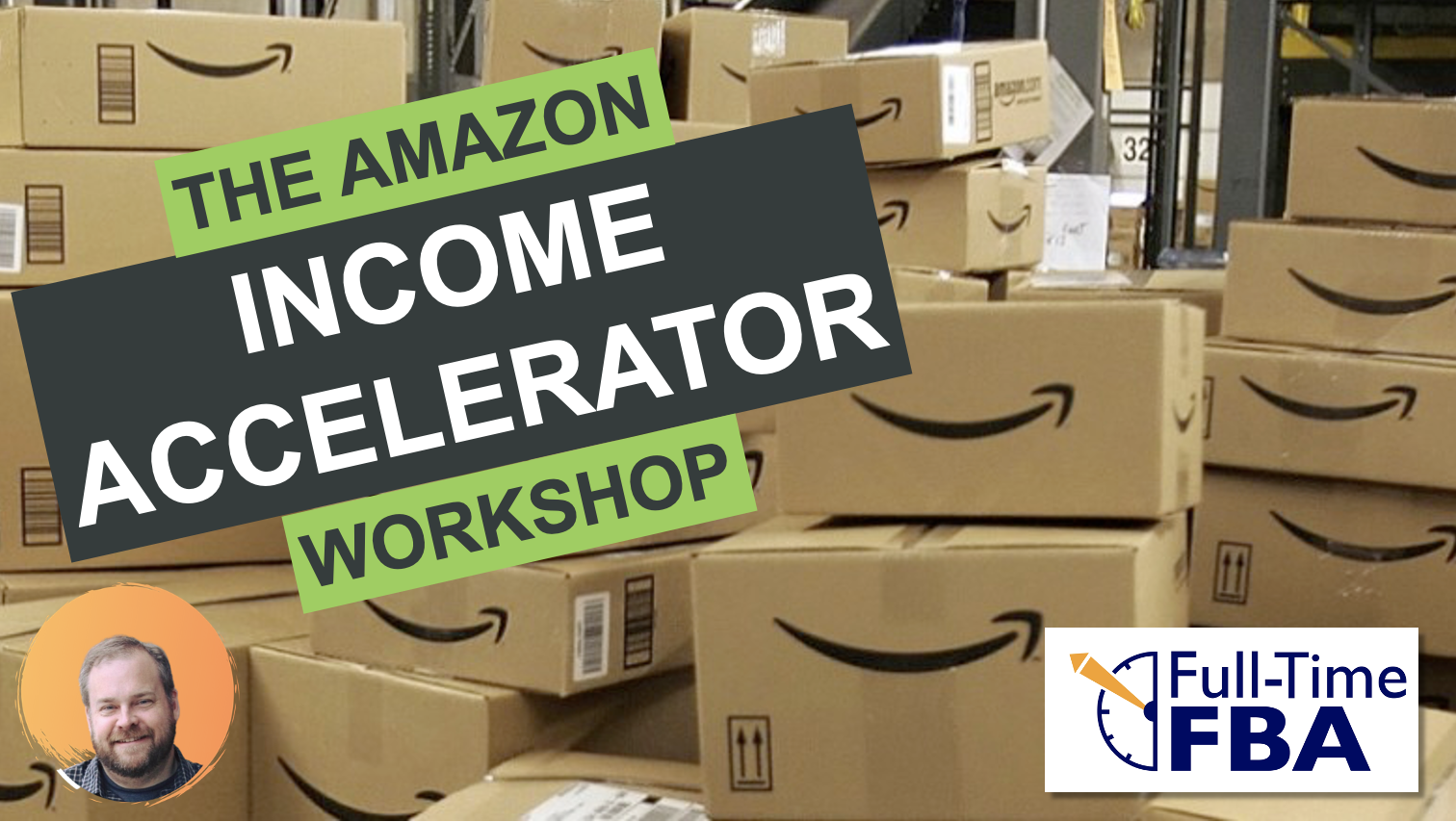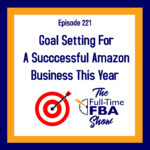In this episode, we unpack the secrets of effective goal-setting for your Amazon business using the SMARTER goals framework and uncover the steps required to turn your Amazon aspirations into actionable plans! From setting precise goals to breaking them down into achievable steps and calendar deadlines, finding accountability, and scheduling regular goal reviews, this episode provides a roadmap to success for your Amazon business.
We also share details about our free upcoming Amazon Income Accelerator Workshop to help individuals achieve full-time income through Amazon sales. For invaluable insights and actionable strategies to transform your Amazon business aspirations into reality, tune in today!
Listen on the podcast player below.
Like what you hear? Tell a friend… and be sure to leave us a rating and a review. Here’s how.
Key points from Episode 221:
 The significance of setting goals for your Amazon business each year.
The significance of setting goals for your Amazon business each year.- Learning from successes and mistakes to avoid repeating them.
- Discover the SMARTER framework for goal-setting.
- Essential action steps after setting goals.
- Why it is vital to re-evaluate your goals regularly.
- Details about our upcoming Amazon Income Accelerator Workshop.
Links and resources mentioned in this episode:
 Episode 64 – Successful Goal Setting for Amazon FBA Sellers with Jo Ann Zimmerman
Episode 64 – Successful Goal Setting for Amazon FBA Sellers with Jo Ann Zimmerman- Setting the Goal of Full-Time FBA
- 5 Simple Strategies to Take the Next Step with Your Amazon FBA Goals
- Evernote
- The Full-Time FBA Coaching Program
- The FREE 5-Day Amazon Income Accelerator Workshop
Right-click here and save as to download this episode to your computer.
![]()
 The Amazon Income Accelerator Workshop
The Amazon Income Accelerator Workshop
Free 5-day online workshop focused on how to realistically make a full-time income selling on Amazon.
Sign up today!
Starts soon!
Replays available daily after the workshop records
We’re going to show you…
- Why Amazon is the best place to focus your time and energy to grow a reselling business that brings in a full-time income.
- How to find unlimited inventory to sell on Amazon for consistent profits.
- How to make the best inventory sourcing decisions (what to resell, what to pass on, how deep to go on a buy, how to replenish your inventory, etc.).
- “The Full-Time Income Success Path” and how you can snowball your Amazon profits.
- How to turn impossible roadblocks into meaningless speed bumps.
- And so much more!
Sign up today!
Back to the main page for The Full-Time FBA Show
More Episodes from the Full-Time FBA Show podcast:
Don’t miss an upcoming episode! Subscribe, download episodes, and review the Full-Time FBA Show:
-
-
- Subscribe on iTunes
- Follow on Spotify
- Follow on Amazon Music (or just ask Alexa to “play The Full-Time FBA Show podcast”)
- Follow on iHeartRadio
- Subscribe on Podbean
- Subscribe on Podbay
- Subscribe on Podchaser
-
![]()
Episode 221 Transcript:

[INTRODUCTION]
[0:00:01.8] ANNOUNCER: Welcome to The Full-Time FBA Show. In each episode, it’s our goal to help you turn part-time hours into a full-time income, selling almost anything on Amazon. Now, your hosts of the show, Stephen and Rebecca Smotherman.
[WELCOME]
[0:00:20] STEPHEN: Welcome to The Full-Time FBA Show episode, number 221. It’s the new year, we are talking about, Goal Setting for a Successful Amazon Business This Year. With me to talk about it is my favorite person to set goals with my wife, Rebecca. How you doing, Rebecca?
[0:00:36] REBECCA: Doing great. I love starting off the new year with setting goals, with thinking through what we’re planning to do for the year, and what we want to accomplish. I’m really excited to get into talking about this episode.
[0:00:48] STEPHEN: Yeah. It’s going to be a good conversation that will hopefully help our listeners set some really good goals for the new year.
[0:00:56] REBECCA: It’s natural to be thinking about goal setting in January. You may be seeing lots of content right now, podcasts, articles, whatever, however, you consume your content about making resolutions, but we prefer to set goals. Personally, I love new beginnings. Love fresh starts. I love setting goals, and starting over the new year. It’s the same here in 2024, as always.
Every year we have the opportunity to make this year our best year yet, but it’s not going to automatically be the best year just by accident. We all need to set some intentions for the new year. We need to set goals, and too many people who do goal setting, they do it, well, I would say wrong, or maybe not wrong, but they’re doing it in a way that’s really ineffective. One of Stephen and my biggest pet peeves is wasting time. So, on today’s episode, we want to be sure you’re not wasting any time, but that you’re using your time wisely when it comes to setting your Amazon business goals for the upcoming year.
[0:02:04] STEPHEN: Yeah. When it comes to setting our own business goals, we first like to look back on the previous year. What worked? What did not work? What needs to be improved? What is not broke, so we don’t fix it, because if it ain’t broke, don’t fix it, right? Seriously, dig deep into the why, when it comes to analyzing what worked and what did not work. This is going to help you possibly avoid repeating some of the mistakes that you made, and maybe you repeat some of the same successes that you accomplished during the year.
[0:02:34] REBECCA: When it comes to finally coming up with our goals each year, Stephen and I like to use a framework called SMARTER goals. Each letter of the word SMARTER is a prompt to make sure your goals are complete and will lead you actively to getting results. To start off, the S in smarter, in the acronym smarter stands for specific. Most times when people don’t realize their goals, it’s because they are not specific enough. The goal is just not specific. For example, sell more inventory on Amazon is just not a very specific goal. It’s not specific at all. Sell more.
What does that mean? Instead, you want to try to set a specific goal, like find five new replens a month via retail arbitrage. That’s very specific. Five new replens every month, retail arbitrage, or you could say, “Work with a virtual assistant to help me secure two new wholesale accounts on average every month.” The more specific your goals are, the easier it will be for you to see if the tasks you’re working on are congruent with those goals and going to help you achieve them.
[0:03:46] STEPHEN: Moving on from S in the word SMARTER, we’re going to M. The M in SMARTER goals stands for measurable. Using a unit of measure is one of the best ways to get your goals to be more specific. You might have noticed it in our example, we said find to five new replens or secure two new wholesale accounts. These numbers provide the opportunity for you to track your results and to know if you’re on target with meeting these goals, rather than randomly sell more inventory. Well, that’s not specific enough. If it’s measurable, it’s going to be able to be more specific.
[0:04:19] REBECCA: Then moving on, we get to A in SMARTER, which is action-based. Every goal needs to have a verb and action behind it, something that you’re doing. An action is going to be what brings you results. You need to be sure that your goal is action-based. For example, find five new replens a month via retail arbitrage by sourcing at Target, Walgreens, Coles, and the grocery store. In this sentence, the verb is sourcing, find by sourcing. While it might be obvious, we just want to be specific here that you’re not going to find replens if you don’t go out and source for them. You need to have that action. What are you going to do? You’re going to go out and source.
[0:05:05] STEPHEN: The next letter in our SMARTER acronym is R. The R stands for realistic. Make sure your goals are actually achievable. Yes, make goals that stretch you, but don’t make them so far out of your reach that they cause you to give up too soon. I mean, setting the goal of making $1 million and take-home money in your first year on Amazon, I’m sorry to tell you, is not realistic. When you make your goals more realistic to fit what your life is like, then that helps them become more achievable in the long term.
[0:05:36] REBECCA: The T in SMARTER is time-bound. SMARTER goals need to be time-bound. A goal without a deadline is just a wish. Write down when you want to accomplish your goal that you’re setting for the year. Here’s a pro tip. Don’t have December 31st be the deadline of all of your goals. So, saying, that’s just setting you up to procrastinate, honestly. Don’t make that your deadline for even most of your goals. That’s just a recipe for a disaster. You need to have monthly goals, have some bigger goals that you spread out once a quarter or in chunks like that. Set some of your goals for June or July.
[0:06:16] STEPHEN: The E and SMARTER goals is exciting. I mean, make sure these goals excite you. Spoiler alert. It’s going to be a long year.
[0:06:23] REBECCA: Twelve whole months.
[0:06:24] STEPHEN: Yes. Working on your goals at times, it’s going to be hard. It’s much easier to stay committed to your goals if there’s something that excites you. When you’re planning out your goals, find something that is exciting that’ll give you the fuel to keep going.
[0:06:38] REBECCA: Yeah. Even before we sat down to start working on this podcast, Stephen and I were talking through some things that we’re going to be doing in the upcoming year, some things that are new for us, some things that are going to be challenging. It’s very exciting. That’s a goal that I am really pumped to be working towards.
[0:06:52] STEPHEN: Me too.
[0:06:53] REBECCA: All right. Finally, we’re going to close out our SMARTER acronym with the second R, the final letter R, and it stands for relevant. Are the goals that you’re setting relevant to your life, to the stage of life that you’re in, to your current finances? How much time you have available? Whether or not you have kids at home, how old those kids are, if they’re older or younger. All of that is going to impact your goals. You want to be sure that your goals are relevant to where you are the season of life that you’re in. If they are relevant, then that will make them more likely to be achievable.
[0:07:31] STEPHEN: We’ll be sure this is in our show notes, but making sure that your goals are specific, measurable, action-based, realistic, time-bound, exciting and relevant are going to help you get set up for a more successful year with these goals. Now, let’s transition now to what to do with these goals next. Once you’ve got these smarter goals, the first thing to do is to write your goals down. Far too often, we find ourselves thinking about and talking to other people about our goals without actually putting pen to paper, writing them down.
Write down your goals. For some reason, the physical action of moving a goal from our brain to a piece of paper has an impact on whether or not we actually stick with our goals. It’s just something in the process of writing it down that causes people to actually achieve more of their goals more often. It sounds crazy, but we’ve seen it to be true. So, write down your goals, post them somewhere you can see them, and keep an eye on them at all times.
[0:08:30] REBECCA: Don’t let go of them.
[0:08:31] STEPHEN: Yes.
[0:08:32] REBECCA: Keep an eye on them at all times. If you don’t like to use pen and paper, using a computer or some other digital method of recording it is also acceptable. I actually keep track of all of my goals in Evernote on my computer. That works too.
[0:08:46] STEPHEN: Yes.
[0:08:47] REBECCA: Then after you write down your goals, you’re going to want to break them down into smaller steps. Just writing down, I want to make $100,000 in sales in 2024. Makes that goal sound a little bit out of reach when you’re starting off in January, especially if you’re just getting started with selling on Amazon. $100,000 sounds like a lot. It is a lot. But if you break that down per month, that is only a little over $8,000, $8,300 in sales per month, and that seems more doable. You can do $8,300 in a month. What’s that old riddle, Stephen? How do you eat an elephant?
[0:09:23] STEPHEN: With steak sauce?
[0:09:25] REBECCA: That’s gross. The saying goes, “How do you eat an elephant? One bite at a time” So, how do you accomplish a big goal? You do it one step at a time. Break down your huge goals into bite-sized pieces, so that you can keep your forward momentum. For example, you can set smaller goals for your Amazon FBA education also. If you set the goal to, for example, finish the jumpstart Amazon course by March, then you could set smaller goals that will help you complete the course on time. You would look at the modules, see how many there are, figure out when you should finish each of the modules in order to reach your March goal, and then go from there.
[0:10:08] STEPHEN: Yeah. You write your goals down, you break them up into smaller goals, and the next step is to put your goals on a calendar. Whether it’s a physical calendar, your phone on your computer, once what your bite-sized goals are, write down the deadlines on your calendar, because having deadlines on your calendar means you’re actually, going to see them regularly. You’re going to keep those goals fresh in your mind. Even more important than putting those deadlines on the calendar, though, is to schedule the time to work on your goals. Make an appointment with yourself to work on achieving your goals.
The bottom line is this, you make time for the things in life that are a priority. So, if your goals are a priority, if growing your Amazon business is a priority, you’re going to set some time aside where no one can interrupt you as best as possible to make progress on your goals. You’re much more likely to actually do something if it’s actually scheduled on your calendar.
[0:10:59] REBECCA: The next thing you’re going to want to do is also find some accountability for working on your goals. It’s easy for most of us to understand that we are our worst accountability partner. We’re the worst at keeping ourselves accountable. We all need someone to walk with us in life as we make progress towards our goals. I’m not talking about just posting this on Facebook for all of your “friends” to see, because that’s not true accountability. Those people are going to see that and keep on scrolling. They’re not going to keep you accountable and they’re not going to come back in a month, and check on that post, and see how you’re doing.
You want to find a specific person, maybe someone who has experience in the area of your goal who you can talk to regularly, and who will even call you out when needed, someone who will ask you honestly about the progress that you’re making or not making. That’s one of the huge benefits of The Full-Time FBA Coaching Program. There’s built-in accountability. At the end of each coaching call, Stephen leads the coaching students in sharing their goals for their Amazon business for the upcoming week—both short-term and long-term goals. Then we check in to see how much progress has been made on those goals in the next call.
[0:12:10] STEPHEN: These steps are simple, writing down the goal, breaking down the goal into smaller goals, putting on the calendar, and setting up accountability. They sound simple, but they have a huge impact, and they’re going to greatly increase your chances of your goals actually, turning into a reality. But something really big, I mean, huge that you need to be sure and prioritize is this. Review your goals regularly. If you only think about your goals in January, you’re only going to be set up for success, maybe in January, but by February and March, you’re going to be back to your old habits, and you’re going to get your old results. You’re not aiming for no more results, right? So, be sure you review your goals regularly.
I know Rebecca and I. We usually, toward the end of each month, we have a meeting scheduled on the calendar to discuss our goals and our values, so that we can remind ourselves of our motivations for reaching these goals. We look at the progress, decide if they’re still relevant. I mean, one year we completely deleted a goal in August, because it was no longer applying to our life situation. Another goal, we reached in July instead of December, so we just crossed that one off.
Review your goals throughout the year, and figure out what next steps need to be taken in order to move things forward. Just find what works for you. For some people, it’s a weekly review. For others, a quarterly review or maybe a monthly review works even better for you. Again, it’s crucial to put this review time on the calendar, because it’s just way too easy to forget to do it. Then we never do it. In fact, we challenge you today, put a reminder on your phone or your calendar to put a monthly review or quarterly review of your goals for each of the next 12 months.
[0:13:47] REBECCA: All right. You want big results, don’t you? You want more sales on Amazon. You want more reseller knowledge. You want to get closer to making that full-time income on Amazon, right? If you follow the steps, we outlined today, you’re much more likely to accomplish your goals in the time you set for yourself than if you just hope and wish that you’ll achieve them. Dreams are good, but we don’t want you to just live your life on dreams. We want you to develop plans that will help your dreams become a reality.
Some of you who are listening to this have some amazing long-term goals for your FBA business. Maybe you are paying off debt. Maybe you are wanting to stay home with your kids. Maybe you want to find freedom from your corporate job or you want to be able to take care of an aging parent or maybe you want to travel the world. Those are all awesome dreams that can become a reality. Working towards your goals will also help you achieve those long-term goals and achieve them faster.
[0:14:47] STEPHEN: If you’re listening to this episode and you’re thinking, Stephen, is it really possible to make a full-time income selling them on Amazon? I mean, I know you’re called full-time FBA, but is that really possible for like a normal person? Is it really possible to get out of debt, to stay home with your kids, maybe travel the world, all from making money on Amazon? Yes, and we want to show you how, because in our upcoming 5-Day Amazon Income Accelerator Workshop, that’s going to happen toward the end of the month. We’re going to be hosting a free workshop where Rebecca and I will be walking you through how to realistically make a full-time income selling on Amazon.
It’s a new year and there’s no better way to start off the new year than getting energized about your Amazon business. I mean, I’m already getting excited about the upcoming accelerator workshop and it is free to sign up. Head over to fulltimefba.com/workshop and sign up. It’ll be less than 90 seconds to sign up and it might be one of the best decisions you make this year. Again, the link, fulltimefba.com/workshop, and we can’t wait to see you there.
[0:15:48] REBECCA: Thank you so much for joining us for this episode of The Full-Time FBA Show. As always, you can find the show notes for this episode at fulltimefba.com/221, because this is episode number 221.
[0:16:00] STEPHEN: Next week on The Full-Time FBA Show, where are we talking about five more mistakes that even smart Amazon sellers make? We’ve had an episode on this topic before. We have five more mistakes we want to make sure you avoid. So, join us next week on The Full-Time FBA Show.
[OUTRO]
[0:16:17] ANNOUNCER: That’s all for this episode of The Full-Time FBA Show. Head over to fulltimefba.com/podcast, where you’ll find the show notes and links from this episode. While you’re there, subscribe to our newsletter where you’ll get several free downloads of our popular and helpful Amazon FBA resources. Now, take action on what you’ve learned today, so you can find success at turning part-time time hours into a full-time income with Amazon FBA.
[END]


Leave a Reply